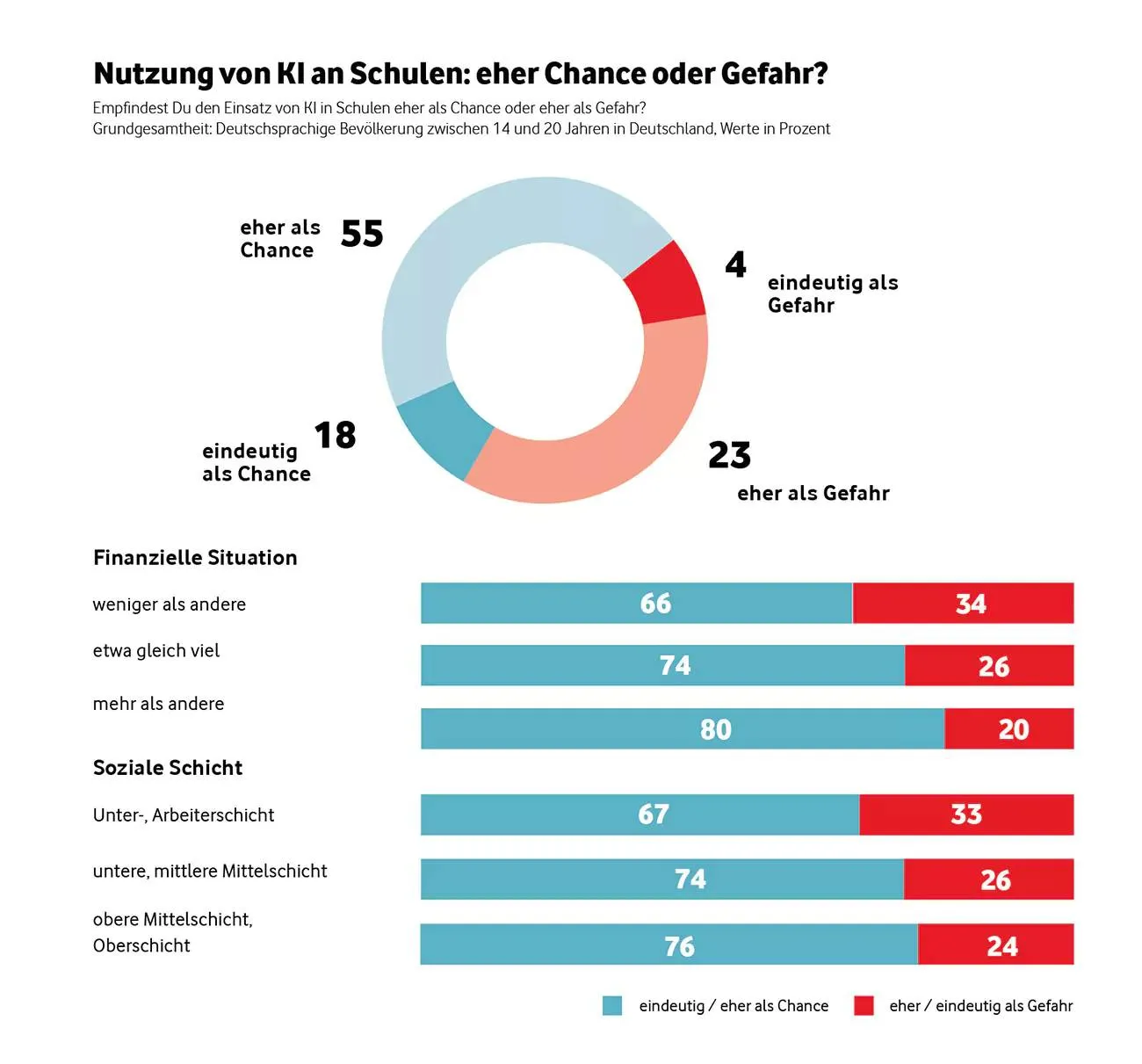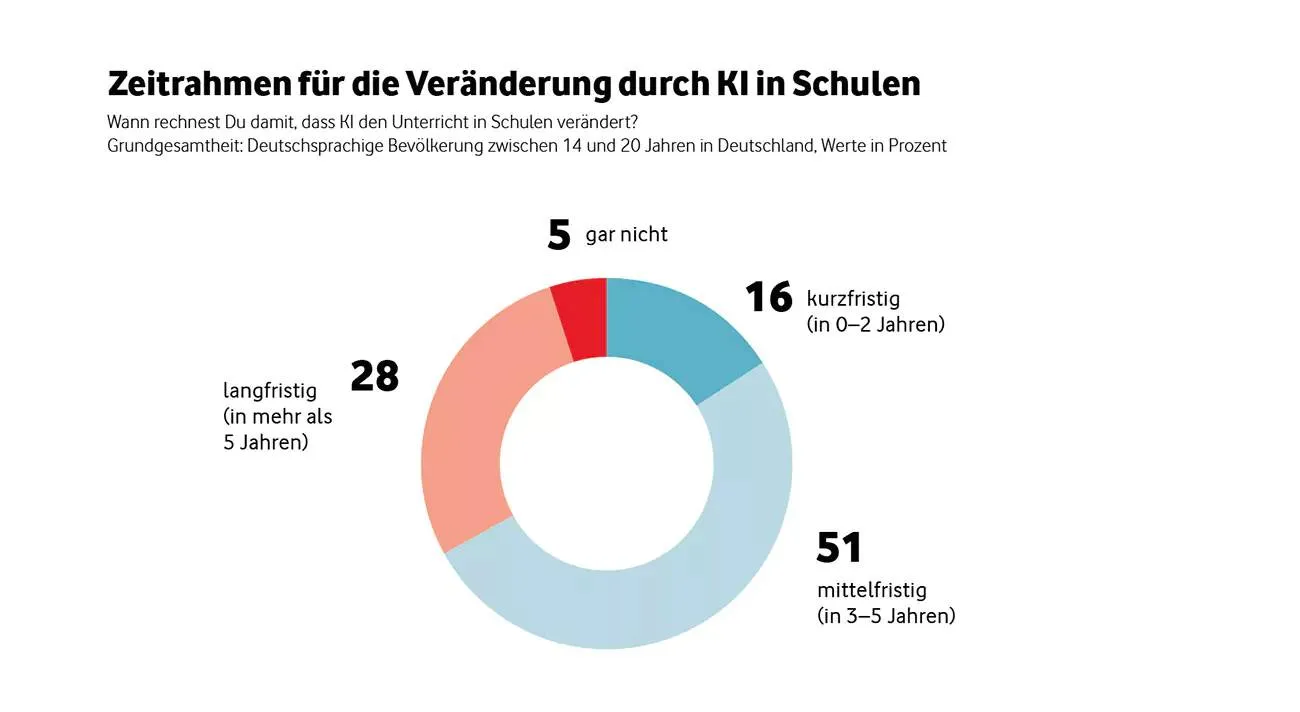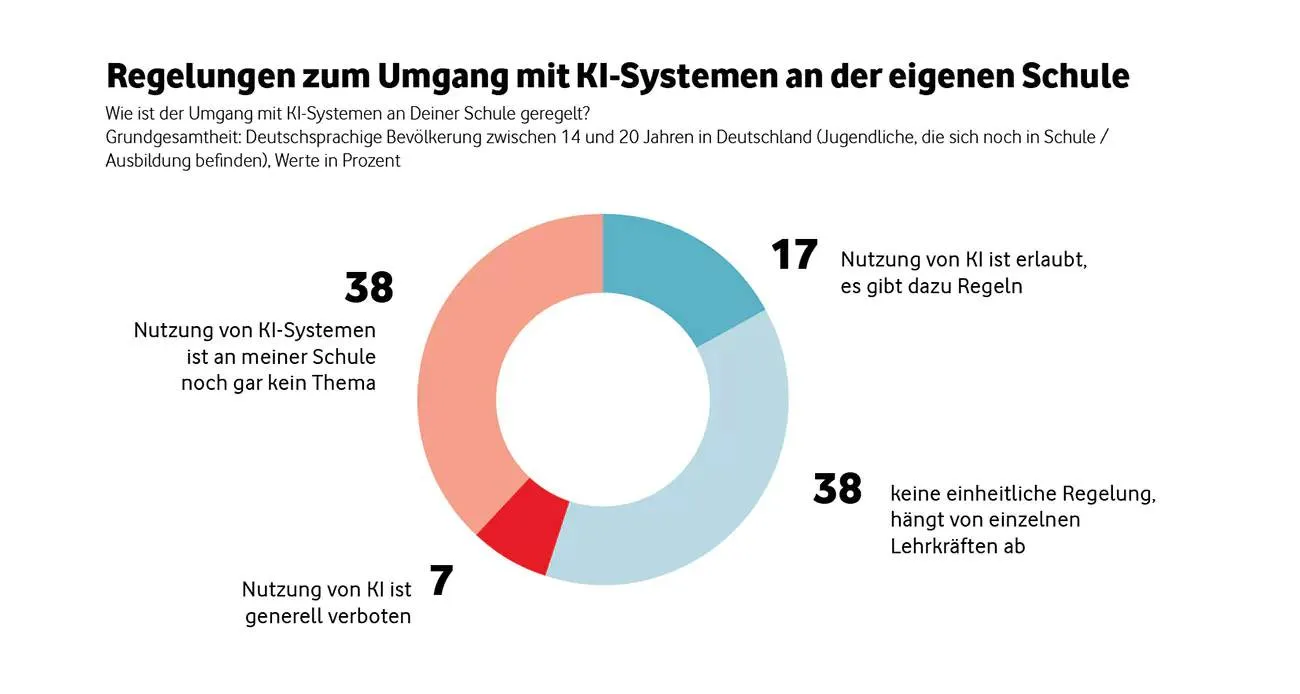While artificial intelligence is already permeating many areas of our everyday lives, schools in Germany are still at the beginning of their journey into this new era. The rapid development of AI, especially in the area of large language models, offers immense opportunities for the school system, but also harbors considerable risks. It is a transformation that requires both learning and letting go. The Vodafone study shows that young people in Germany are already further along in this respect than educational institutions. Most teenagers and young adults see AI not only as relevant for their future, but also as crucial for their personal development and professional success.
The integration of AI into the classroom is seen as an opportunity to fundamentally improve learning and teaching methods. However, there is also concern that pupils from weaker social backgrounds may not benefit from the opportunities offered by AI and that the gap between them and the higher achievers may even widen. Young people already have ideas about which aspects of AI should be included in the curriculum and which skills in dealing with AI should be promoted. It is up to schools to ensure that everyone benefits equally.
The task is to teach the intelligent use of AI in learning processes quickly and in a targeted manner. The study aims to raise awareness of the perspectives and needs of young people in Germany. By listening to their voices, we recognize their hopes and fears in dealing with AI as well as the benefits we can achieve by including their opinions and experiences in the transformation processes.
With the findings from this study, Vodafone wants to stimulate a constructive dialog about the necessary changes in education. Together, teachers and students must be prepared for a future in which the responsible and constructive use of artificial intelligence and its consequences will be a key skill for all of us.
Table of contents
Overview of the AI study: methodology and demographic details of respondents.
The study by the Vodafone Foundation, conducted by Infratest dimap, records the attitudes of 1590 young people aged 14 to 20 on the role of artificial intelligence (AI) in their education and future working life. It sheds light on how German students experience AI in the classroom.
Young people expect AI to play a greater role in their future working lives, but it is rarely taught in schools.
According to the study, German pupils would like to learn about AI applications and how to use them in class. Responses from young people support the urgency of this wish.

89% of them would like to be supported by AI, especially in obtaining information, with 58% already using it for this purpose. In contrast, only 64% of young people emphasize the importance of knowing that AI tools can make mistakes. They therefore consider the ability to be critical of what they have read or seen to be particularly important when using AI. Only 46% would like to learn more in class about the risks associated with AI and how to deal with them.
However, more young people should be made aware that artificial intelligence is not always reliable and can also provide incorrect information - as well as the situations in which they are already unconsciously using AI systems.
Attitudes and expectations of young people for AI at school
Young people have so far used AI independently: Although the use of AI at school is limited, this does not mean that AI has not long since found its way into young people's private everyday lives: 74 percent of respondents already use AI applications, with 71 percent stating that their use is more often of their own accord for private or school purposes and less often prompted by school. A significantly lower proportion of 31% use AI several times a week for school purposes, while only 8% use it at least once a day. The most frequently used applications include ChatGPT, followed by Google Lens and DeepL.

The infographic shows the results of a survey on the expected timeframe for changes in school lessons through artificial intelligence (AI) among the German-speaking population aged between 14 and 20 in Germany. According to the survey:
- 51% of respondents expect AI to change teaching in schools in the medium term (in 3-5 years).
- 28% think that this will happen in the long term (in more than 5 years).
- 16% expect short-term changes (in 0-2 years).
- 5% assume that AI will not change teaching at all.
These results show that a majority of young people in Germany expect AI to change education within the next decade, with the largest group predicting a change in the 3-5 year timeframe. Only a small minority do not believe that AI will have an impact on school education. The results may be of interest to educational planners considering how and when to integrate AI technologies into curricula and classrooms.
Orderly use in the classroom is not yet widespread
38% of the young people surveyed stated that the use of AI in their school is either not an issue at all or that there is no clear policy on the subject. Only 17% of respondents stated that the use of AI is permitted at school and that there are corresponding rules in place.
There was a clear opinion among respondents as to when AI should be integrated into school lessons. The majority are in favor of AI not being included in the curriculum until secondary level I or II. Only 9% are in favor of learning how to use AI as early as elementary school, nursery or pre-school. 24 percent can imagine AI lessons taking place from the fifth grade onwards, while 33 percent advocate this from the seventh grade onwards. 19 percent of respondents believe that AI should only be taught at upper secondary level. A minority of 9% believe that AI should not be taught at all in educational institutions.

ChatGPT tops the list when it comes to the most frequently used AI tools, especially for searching for information. The study makes it clear that young people have already firmly integrated AI into their everyday lives. 74% state that they use AI tools, while only 26% have not yet consciously gained experience with AI either in class or at home. AI systems are often used independently for private or school purposes, but rarely on the initiative of teachers (71%). The most frequently used AI tool is ChatGPT from OpenAI (46 percent), followed by Google Lens (25 percent), Apple's Siri (24 percent), Snapchat's "My AI" (19 percent), DeepL (14 percent), Google Bard (7 percent) and Grammarl (4 percent). Midjourney, Dalle and Grok (from X/Twitter) are far behind with only 2 percent usage each.
The AI tools are mainly used for research and information search purposes (58%). In addition, 50 percent of respondents use AI to explain terms, while 45 percent approach entire topics in this way. 32% expect AI systems to point out solutions and 27% expect complete solutions or texts. So far, only 13% of respondents have used AI applications to provide feedback on their own work.
How teachers and educational institutions should respond
The rapid development of technology and artificial intelligence (AI) has a direct impact on the education sector. Teachers and educational institutions face the challenge of preparing their students for the future in which AI will play an increasingly important role. In the face of this challenge, it is crucial that teachers turn to innovative resources and platforms to teach their students relevant skills and knowledge.
One platform that is proving particularly useful for teachers and students is TutKit.com. With a variety of courses and training, including most notably on AI, TutKit.com offers a comprehensive and accessible way to engage with this important topic. Here are some conclusions and recommendations on how teachers and educational institutions can respond, and TutKit.com's role in doing so:
- Updating curriculum: Teachers should review their curricula and ensure that they reflect current developments in technology, including AI. TutKit. com offers a variety of courses and materials that can be integrated into the curriculum to provide students with a basic understanding of AI.
- Training for teachers: Educational institutions should provide training for teachers to familiarize them with the basics of AI and how to use these concepts effectively in the classroom. TutKit.com offers training and resources specifically for teachers to help them understand and integrate AI concepts into the classroom.
- Integration of technology: Teachers should utilize technology and online platforms like TutKit.com to provide an interactive and engaging learning experience for their students. By integrating TutKit.com courses into the classroom, teachers can give their students a hands-on insight into the world of AI.
- Encouraging self-learning: Educational institutions should give students the opportunity to learn on their own and familiarize themselves with new technologies such as AI. TutKit.com provides a user-friendly platform where students can learn at their own pace, supported by high-quality courses and resources.
- Partner with Tut Kit.com: Educational institutions can purchase a classroom license from TutKit.com to provide their students with access to high-quality AI training. Through such a classroom license, teachers and students can benefit from TutKit.com 's extensive resources and expertise.
Overall, it is crucial that teachers and educational institutions proactively respond to the challenges and opportunities presented by the increasing importance of AI in the education sector. By utilizing innovative resources such as TutKit.com, teachers can provide their students with a comprehensive understanding of AI and prepare them for a successful future in a technology-driven world. By the way, TutKit.com offers gamification features so that students can also have fun learning and test their knowledge with various quizzes and download a personalized certificate. And should the next pandemic break out, students can even use TutKit.com from home.
Summary
Artificial intelligence is all the rage among young people in Germany. But when it comes to schools, it somehow gets left out. Many schools don't really seem to be interested in AI, while others even ban it altogether.today's young people have long since realized that AI is important and that you need to know about it if you want to get ahead in your job.
In schools, the topic of artificial intelligence is often neglected or even completely banned. While AI is slowly but surely finding its way into the everyday lives of young people, it rarely seems to find its way into German classrooms. This can lead to young people perceiving the reality of their lives and what they learn in class as two different worlds. It also looks as if young people in Germany are not currently being adequately prepared for the challenges and opportunities that AI has in store for their future lives.
Most people who were interviewed see huge opportunities in integrating AI firmly into the classroom. For them, this is an opportunity that could improve learning and teaching. But interestingly, young people with less formal education are not quite as optimistic. Perhaps this is due to their more critical attitude or because they don't know enough about the potential of this technology for learning. If this continues, it could lead to a long-term divide in society in terms of access to the digital world. To avoid this, we need better education and to integrate AI more into the classroom so that everyone can learn together through practical applications.
When teachers use AI in the classroom, it is often only to a limited extent and restricted to certain areas, according to young people. This suggests that teachers still lack the skills to use AI in the classroom and therefore feel insecure. As a result, many pupils remain unaware of how versatile AI could actually be used in a school context. Interestingly, however, the young people show great interest in finding out where AI can be put to good use.
The young people already have a fairly differentiated view of AI, even in the school environment. Most of them understand that it is important not to swallow everything that is generated by AI. They also attach great importance to having the ability to question AI critically. At least that is what the answers from 14 to 20-year-olds in the surveys show.
Most participants in the survey are in favor of adapting examination formats: many are unsure whether they will even be able to distinguish between their own performance and AI-generated content in the future. For this reason, they are calling for the examination formats to be adapted. Instead of focusing solely on memorization, they argue that exams should focus more on application and problem-solving skills.
This is what young people would like to learn about AI: critical reflection, responsibility and confidence in dealing with data.
The young people surveyed showed great interest in both exploring practical applications of AI and raising awareness of potential risks. Almost half of the participants in the study would like to learn how to use AI systems effectively at school or in everyday life. They are also interested in specific questions about the operation and functionality of AI systems as well as overarching social aspects.
Most young people are against the use of AI in elementary school and instead advocate its use from lower secondary level onwards.
Teachers who already use Tutkit.com




